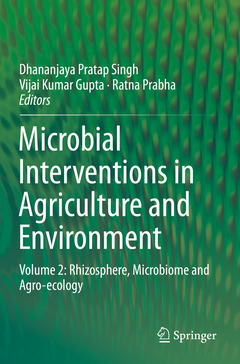Microbial Interventions in Agriculture and Environment, 1st ed. 2019 Volume 2: Rhizosphere, Microbiome and Agro-ecology
Coordonnateurs : Singh Dhananjaya Pratap, Gupta Vijai Kumar, Prabha Ratna

Microbial communities and their functions play a crucial role in the management of ecological, environmental and agricultural health on the Earth. Microorganisms are the key identified players for plant growth promotion, plant immunization, disease suppression, induced resistance and tolerance against stresses as the indicative parameters of improved crop productivity and sustainable soil health. Beneficial belowground microbial interactions with the rhizosphere help plants mitigate drought and salinity stresses and alleviate water stresses under the unfavorable environmental conditions in the native soils. Microorganisms that are inhabitants of such environmental conditions have potential solutions for them. There are potential microbial communities that can degrade xenobiotic compounds, pesticides and toxic industrial chemicals and help remediate even heavy metals, and thus they find enormous applications in environmental remediation. Microbes have developed intrinsic metabolic capabilities with specific metabolic networks while inhabiting under specific conditions for many generations and, so play a crucial role. The book Microbial Interventions in Agriculture and Environment is an effort to compile and present a great volume of authentic, high-quality, socially-viable, practical and implementable research and technological work on microbial implications. The whole content of the volume covers protocols, methodologies, applications, interactions, role and impact of research and development aspects on microbial interventions and technological outcomes in prospects of agricultural and environmental domain including crop production, plan-soil health management, food & nutrition, nutrient recycling, land reclamation, clean water systems and agro-waste management, biodegradation & bioremediation, biomass to bioenergy, sanitation and rural livelihood security. The covered topics and sub-topics of the microbial domain have high implications for the targeted and wide readership of researchers, students, faculty and scientists working on these areas along with the agri-activists, policymakers, environmentalists, advisors etc. in the Government, industries and non-government level for reference and knowledge generation.
1. Microbial Inoculants for Sustainable Crop Management.- 2. Manufacturing and Quality Control of Inoculants from the Paradigm of Circular Agriculture.- 3.Microbial Biological Control of Diseases and Pests., 3.PGPR Inoculation and Chemical Fertilization of Cereal Crops, How do the Plants and Their Rhizosphere Microbial Communities’ Response?.- 4. PGPR Inoculation and Chemical Fertilization of Cereal Crops, How do the Plants and Their Rhizosphere Microbial Communities’ Response?.- 5. Biological Treatment: A Response to the Accumulation of Biosolids.- 6. Microbial Bioconversion of Agricultural Wastes for Rural Sanitation and Soil Carbon Enrichment.- 7. Plant Growth-Promoting Rhizobacteria (PGPRs): Functions and Benefits.- 8. Functional Diversity of Plant Growth Promoting Rhizobacteria: Recent Progress and Future Prospects.- 9. Microbial Augmentation of Salt Affected Soils: Emphasis on Haloalkalitolerant PGPR.- 10. Impact of Plant Associated Microbial Communities on Host Plants under Abiotic Stresses.- 11. Alleviating Drought Stress of Crops through PGPR: Mechanism and Application.- 12. Fertilizer Nitrogen as a Significant Driver of Rhizosphere Microbiome in Rice Paddies.- 13. Environmental Remediation: Microbial and Non-Microbial Prospects.- 14. Tree ecosystem: Microbial Dynamics and Functionality.- 15. Engineering Rhizobacterial Functions for the Improvement of Plant Growth and Disease Resistance.- 16. Impact Assessment of Microbial Formulations in Agricultural Soil.- 17. Harnessing the Microbial Interactions in Rhizosphere and Microbiome for Sustainable Agriculture .- 18. Plant Microbiome Interaction and the Effects of Biotic and Abiotic Components in Agroecosystem.- 19. Plant-Microbial Communication – New Facets for Sustainable Agriculture.
Dhananjaya P. Singh is presently Principal Scientist in Biotechnology at ICAR-National Bureau of Agriculturally Important Microorganisms, Maunath Bhanjan, India. He did his Masters' degree from G.B. Pant University of Agriculture & Technology, Pantnagar and Ph.D. in Biotechnology from Banaras Hindu University, Varanasi. His research interests include plant-microbe interactions, bioprospecting of metabolites of microbial and plant origin, microbe-mediated stress management in plants, metabolomics-driven search for small molecules and bioinformatics in microbial research. He has been working on the societal implications of microbial biotechnology pertaining to microbe-mediated crop production practices and rapid composting of residual agricultural wastes at farm and farmers levels. Such practices are now reaching among the farming communities for their adoption at field scale. He has been associated with the development of supercomputating infrastructure for agricultural bioinformatics in microbial domain at ICAR-NBAIM under National Agricultural Bioinformatics Grid (NABG) program of ICAR, India. He is an Associate of National Academy of Agricultural Sciences (NAAS), India and has been awarded with several prestigious awards including Dr. A. P. J. Abdul Kalam Award for Scientific Excellence. With more than 150 publications in the journals of National and International repute Dr. Singh has also edited five books on microbial research with Springer Nature and other publishers.
Dr. Vijai Kumar Gupta is the Senior Scientist, ERA Chair of Green Chemistry, Tallinn University of Technology, Estonia. His area of research interests are- Bioactive Natural Products, Microbial Biotechnology and Applied Mycology, Bioprocess Technology, Biofuel & Biorefinery Research, Glycobiotechnology of Plant-Microbial Interactions. He is the Secretary of European Mycological Association, Country Ambassad
Provides authentic and well-presented content with multiple microbial functions and their benefits in agro-ecology for readers to learn beneficial microbial processes, mechanisms and gaps in the knowledge
Presents well-written and documented environmental problems in current perspectives and their microbial remediation for the researchers, faculties and students
Presents characteristic microbial functions and their ecological benefits
Date de parution : 11-2020
Ouvrage de 573 p.
15.5x23.5 cm
Disponible chez l'éditeur (délai d'approvisionnement : 15 jours).
Prix indicatif 210,99 €
Ajouter au panierDate de parution : 11-2019
Ouvrage de 573 p.
15.5x23.5 cm
Disponible chez l'éditeur (délai d'approvisionnement : 15 jours).
Prix indicatif 210,99 €
Ajouter au panier


